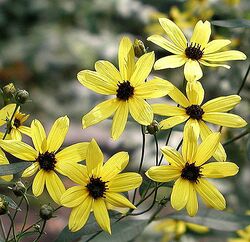Biology:Coreopsis tripteris
| Coreopsis tripteris | |
|---|---|

| |
| Scientific classification | |
| Kingdom: | Plantae |
| Clade: | Tracheophytes |
| Clade: | Angiosperms |
| Clade: | Eudicots |
| Clade: | Asterids |
| Order: | Asterales |
| Family: | Asteraceae |
| Genus: | Coreopsis |
| Species: | C. tripteris
|
| Binomial name | |
| Coreopsis tripteris | |
| Synonyms[1] | |
| |
Coreopsis tripteris is a North American species of flowering plant in the family Asteraceae. It is widespread across much of eastern and central North America from the Florida Panhandle west as far as eastern Texas and north to Québec and Ontario.[2] Its common names include tall tickseed, tall coreopsis,[3] and Atlantic coreopsis.[4]
This perennial herb usually reaches nearly 100 cm (40 inches) in height, sometimes approaching 200 cm (80 inches). The leaves are mostly divided into 3 leaflets which are smooth-edged to lobed and several centimeters long. The flower heads have yellow ray florets 1 to 2 cm (0.4 to 0.8 in) long, or longer. The center of the head has many disc florets in shades of reddish brown to purplish.[5] It produces short, stout rhizomes.[6]
This plant grows in moist habitat, such as streambanks and wet meadows. It flowers in summer.[5]
This plant is commercially available for use in cultivation as an ornamental.[7]
References
- ↑ The Plant List, Coreopsis tripteris L.
- ↑ Biota of North America Program 2014 county distribution map
- ↑ {{citation | mode = cs1 | title = Coreopsis tripteris | work = Germplasm Resources Information Network (GRIN) | url = | publisher = [[Organization:Agricultural Research ServAgricultural Research Service (ARS), United States Department of Agriculture (USDA) | access-date = 21 January 2018 }}
- ↑ Coreopsis tripteris. Integrated Taxonomic Information System.
- ↑ 5.0 5.1 Coreopsis tripteris. Flora of North America.
- ↑ Coreopsis tripteris. Online Virtual Flora of Wisconsin
- ↑ Coreopsis tripteris. Lady Bird Johnson Wildflower Center. University of Texas, Austin.
External links
Wikidata ☰ Q4232937 entry

